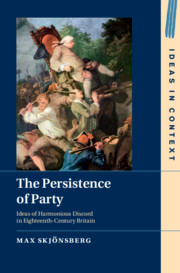Book contents
- The Persistence of Party
- Ideas In Context
- The Persistence of Party
- Copyright page
- Dedication
- Contents
- Figures
- Acknowledgements
- Note on the Text
- Abbreviations
- Introduction
- Chapter 1 Background, Contexts, and Discourses
- Chapter 2 Rapin on the Origins and Nature of Party Division in Britain
- Chapter 3 Bolingbroke’s Country Party Opposition Platform
- Chapter 4 David Hume’s Early Essays on Party Politics
- Chapter 5 Faction Detected? Pulteney, Perceval, and the Tories
- Chapter 6 Hume on the Parties’ Speculative Systems of Thought
- Chapter 7 Hume and the History of Party in England
- Chapter 8 Political Transformations during the Seven Years’ War: Hume and Burke
- Chapter 9 ‘Not Men, But Measures’: John Brown on Free Government without Faction
- Chapter 10 Edmund Burke and the Rockingham Whigs
- Chapter 11 Burke’s Thoughts on the Cause of the Present Discontents
- Chapter 12 Burke and His Party in the Age of Revolution
- Chapter 13 Burke and the Scottish Enlightenment
- Conclusion
- Bibliography
- Index
Chapter 3 - Bolingbroke’s Country Party Opposition Platform
Published online by Cambridge University Press: 27 January 2021
- The Persistence of Party
- Ideas In Context
- The Persistence of Party
- Copyright page
- Dedication
- Contents
- Figures
- Acknowledgements
- Note on the Text
- Abbreviations
- Introduction
- Chapter 1 Background, Contexts, and Discourses
- Chapter 2 Rapin on the Origins and Nature of Party Division in Britain
- Chapter 3 Bolingbroke’s Country Party Opposition Platform
- Chapter 4 David Hume’s Early Essays on Party Politics
- Chapter 5 Faction Detected? Pulteney, Perceval, and the Tories
- Chapter 6 Hume on the Parties’ Speculative Systems of Thought
- Chapter 7 Hume and the History of Party in England
- Chapter 8 Political Transformations during the Seven Years’ War: Hume and Burke
- Chapter 9 ‘Not Men, But Measures’: John Brown on Free Government without Faction
- Chapter 10 Edmund Burke and the Rockingham Whigs
- Chapter 11 Burke’s Thoughts on the Cause of the Present Discontents
- Chapter 12 Burke and His Party in the Age of Revolution
- Chapter 13 Burke and the Scottish Enlightenment
- Conclusion
- Bibliography
- Index
Summary
This chapter builds on the framework and context established in Chapter 1, which in many ways shaped the political experience of Henry St John, 1st Viscount Bolingbroke (1678–1751). It provides a revisionist interpretation by demonstrating that, rather than an anti-party writer, Bolingbroke is best understood as the promoter of a very specific party, a systematic parliamentary opposition in resistance to what he perceived to be a Court Whig faction in power. Drawing on all of Bolingbroke’s well-known works, as well as his lesser-known journalism and unpublished sources, the chapter shows how most of his writings were calculated to legitimise opposition in the shape of a specific kind of political party: the Country party.
Keywords
- Type
- Chapter
- Information
- The Persistence of PartyIdeas of Harmonious Discord in Eighteenth-Century Britain, pp. 77 - 110Publisher: Cambridge University PressPrint publication year: 2021

